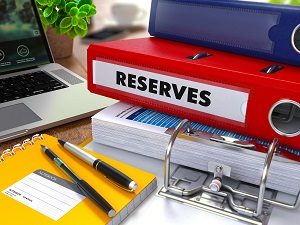How you handle your HOA reserve funds really makes a difference in the successful running of your association. The quality of the strategic planning of your HOA can actually make or break your community. Your manner of managing HOA reserve funds is also really important for the longevity and future investments of your association.
In this article:
- Managing HOA Reserve Funds Properly
- Investing HOA Reserve Funds
- Choosing a Bank
- Aim for Successful Reserve Management
Managing HOA Reserve Funds Properly
A reserve fund is savings set aside by an HOA board for unexpected expenses not covered by insurance. This can be anywhere from the replacement of worn-out facilities to the repair of extreme damages caused by a natural disaster. Improper management of these reserves could land you and your HOA in serious financial trouble.
As a member of the board, it’s your responsibility to stay on top of your reserve fund and make sure it’s regulated well. Here are some tips for handling HOA reserve funds:
1. Understand When to Use Your Reserves

The purpose of a reserve fund is to provide the HOA with a financial safety net in case of emergencies or unforeseen occurrences. It’s not for the maintenance of community properties; rather, it’s for the repair and replacement of such things.
If you use it for maintenance or other unnecessary expenditures, then you’re doing your association and fellow members a disservice.
As a board member, you must always act within the community’s best interests. Misuse of funds is a great abuse of power and, even worse, can be legally held against you. When in doubt, ask yourself these questions to determine whether you must use your reserve funds or not:
- Is this a recurring expense? If the same expense is going to come up in the next month or so, then it’s likely an operating expense. As such, you must use your HOA’s operating fund to cover the cost instead of the reserve fund.
- Is this a capital improvement? If you’re adding a new facility or feature to your community, then that’s a capital improvement. In that case, you mustn’t use the reserves to pay for it. Remember: reserves are only for replacements, repairs, and other unforeseen expenditures. A new addition to the community would’ve likely involved planning and, therefore, a separate budget or fund to cover it.
2. Know the Correct Reserve Level
 When you don’t have enough money in your HOA’s reserves, a bad situation could quickly become dire. Apart from not having the funds to pay for repairs or replacements, you may need to turn to community members for more capital. Nobody likes special assessments, but a lack of finances could make it your only option.
When you don’t have enough money in your HOA’s reserves, a bad situation could quickly become dire. Apart from not having the funds to pay for repairs or replacements, you may need to turn to community members for more capital. Nobody likes special assessments, but a lack of finances could make it your only option.
Most associations’ reserve funds are often underfunded. To avoid this, you must determine the right reserve level for your HOA. The calculations may turn you off, but it’s actually quite simple.
First, assess the life of the association’s major capital systems to arrive at how much life they have left. Then, estimate how much repairs or replacements will cost you by the time they deteriorate. With an amount in mind, finally, compute how much money you need to save annually to cover the cost of these items.
3. Conduct a Reserve Study
While it’s important to know what your HOA’s correct reserve level is, you may need to go a step further. Consider performing a reserve study to get a complete picture of your reserve’s financial health. Reserve studies mustn’t be done by amateurs, though. Instead, seek the help of a professional in the form of a financial advisor or an HOA management company. Make sure to keep your reserve study updated every year.
Managing HOA reserve funds inappropriately will not only land you in hot water with the community but may also give rise to legal liability. It would do you and your HOA board well to take the matter seriously.
Investing HOA Reserve Funds
 An HOA’s reserve funds don’t have to sit idly in a corner gathering dust. On the contrary, your board can reach the right reserve level faster by investing HOA reserve funds.
An HOA’s reserve funds don’t have to sit idly in a corner gathering dust. On the contrary, your board can reach the right reserve level faster by investing HOA reserve funds.
You might be tempted to just have your banker handle the investment planning, but it’s worth considering other options. If it’s an option for the homeowners association, think about hiring a financial advisor.
They can provide your board with advice on properly managing HOA reserve funds, plus assist in tracking them. Interest yields are always changing, and it can be hard to follow those changes without a professional’s help.
But if paying for an advisor is not financially feasible for your HOA, your board members will have to take it on themselves. To properly set your investment goals, you should have a clearly written and defined investment policy. This usually includes:
- • A plan that is fully risk-free, which means full FDIC coverage. In some cases, you might need a strategy that is more aggressive.
- • A trade-off between yield, liquidity, and safety. What this means is that if an investment plan is more liquid, the return is usually lower. A potential yield that is higher generally means a more risky plan.
What the board must do is find the best balance between yield, the safety of your HOA members’ money, and liquidity. An easy guide is to be sure the majority opinion of your members should correspond to the level of risk taken.
Choosing a Bank
The following should be considered when choosing a bank to handle your reserve planning:
- The risk of investment and depositor insurance options
- Access to the association’s funds and deposit term in contrast with the provided rates
- The years of experience the bank has in working with HOAs and handling HOA reserves
Aim for Successful Reserve Management
To make sure you have a prosperous homeowners association, the key is responsibly handled growing reserves and safe investing. It may take some time to properly plan a strategy, but the work pays off in the end. Always work towards improvement and stay on top of tracking and managing HOA reserve funds.
Most associations turn to HOA management companies for help when it comes to handling reserve funds — and there’s no shame in that. If you decide to do the same, make sure to keep us in mind.
RELATED ARTICLES:
- HOA Reserve Funds: What Is It For And How Much Money Does It Need?
- HOA Reserve Studies Methods: Pooled VS Component
- HOA Capital Improvements: Is Funding Them Necessary?






